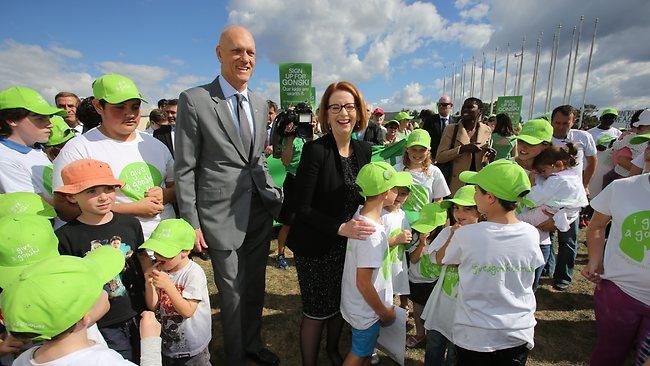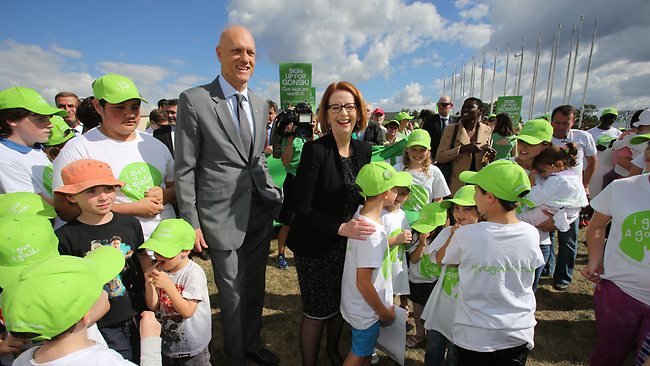Premiers blast schools red tape as Julia Gillard faces rejection over Gonski reforms
THE imposition of a new federal bureaucracy over state education systems has emerged as a fresh sticking point for Julia Gillard's Gonski school reforms.

THE imposition of a new federal government bureaucracy over state education systems has emerged as a fresh sticking point in Julia Gillard's negotiations with premiers and chief ministers over her Gonski school funding reforms.
Entering today's Council of Australian Governments meeting in Canberra, Queensland Premier Campbell Newman and Western Australia's Colin Barnett accused the Prime Minister of trying to control state schools from Canberra.
Mr Newman said the federal government wanted to micro-manage state schools.
“I think many of the principals and teachers would be appalled if they knew that a huge new bureaucracy was being created, and a huge amount of very prescriptive reporting and bureaucratic form-filling was required,” he said.
Mr Barnett said the proposal was “an insult” to Western Australia and aimed to increase federal government control over WA schools.
He said his state was in the process of devolving control of its state schools to principals.
“What is proposed by the Prime Minister goes in the opposite direction,” Mr Barnett said.
“It brings a whole new layer of education regulation from Canberra.”
He said the proposal would deliver WA schools 25 per cent less funding than they already received, and lead to increased state government support of private schools.
“This proposal is about more central and government control in Canberra over schools. And the bottom line is that as state premier, my responsibility to state government education. I will not divert funding from state education away to independent and Catholic schools. That will not happen.”
Ms Gillard will be left disappointed today, with not one premier or chief minister expected to sign up to her Gonski reform proposal today.
Northern Territory Chief Minister Adam Giles said he would not agree to the deal in its current form, which imposes new bureaucratic control over teachers and principals and cuts funding to universities to help pay for the reforms.
“What's currently on offer is a deadly deal in the dying days of a bad Labor government at the federal level,” he said.
Victorian Premier Denis Napthine said the federal government needed to be up-front and honest, providing more details of its funding offer.
He said Victoria had concerns about taking money from the university sector to pay for new schools funding, and about securing funding for kindergartens.
“Robbing Peter to pay Paul is not the way forward for education,”Dr Napthine said.
South Australian Premier Jay Weatherill said he also wanted a fair share for his state.
“It's fundamentally a financial ask of the states, South Australia in particular, which is a very big ask,” he said.
Mr Weatherill said it was “absolutely crucial” the states and territories had a commonwealth partner for public education.
Federal School Education Minister Peter Garrett urged the states to put the interests of students ahead of politics.
Mr Garrett said today's COAG meeting had been preceded by an outbreak of politics.
“If ministers and premiers come to COAG with a view to basically playing out a political exchange and we don't put the interest of students in schools first, then we run the risk of not securing a reform that is so urgently needed in our schools and which the community and the public expect us to reach,” he told ABC radio.
Ms Gillard has given the states and territories until June 30 to sign up to an education funding overhaul which would require them to contribute 35 per cent of the extra $14.5 billion for schools and increase education spending by an indexed three per cent a year in return for federal increments of 4.7 per cent.
Mr Garrett says the government isn't planning to stump up any more cash than what's in the package.
“We are not proposing to provide additional investment at this point in time. Neither should we. This is a model based on meeting needs of students in schools,” he said.
“If we don't do it we will see less resources going to schools in future.”
Mr Newman said he was chasing `the best possible deal”.
He said Queensland was prepared to stump up $830 million over five years for schools, but the commonwealth was insisting on $1.3 billion.
But he said he could not accept the proposal when money was being taken from kindergartens and universities.
“I want the money for our schools, and I welcome their offer. But what people have to understand is that it is coming with a whole lot of problems,” he said.
He reiterated his view that COAG was a “dysfunctional farce”, with a Prime Minister who simply demanded the states sign up to her plans.
“That's not how to run a federation,” he said.





